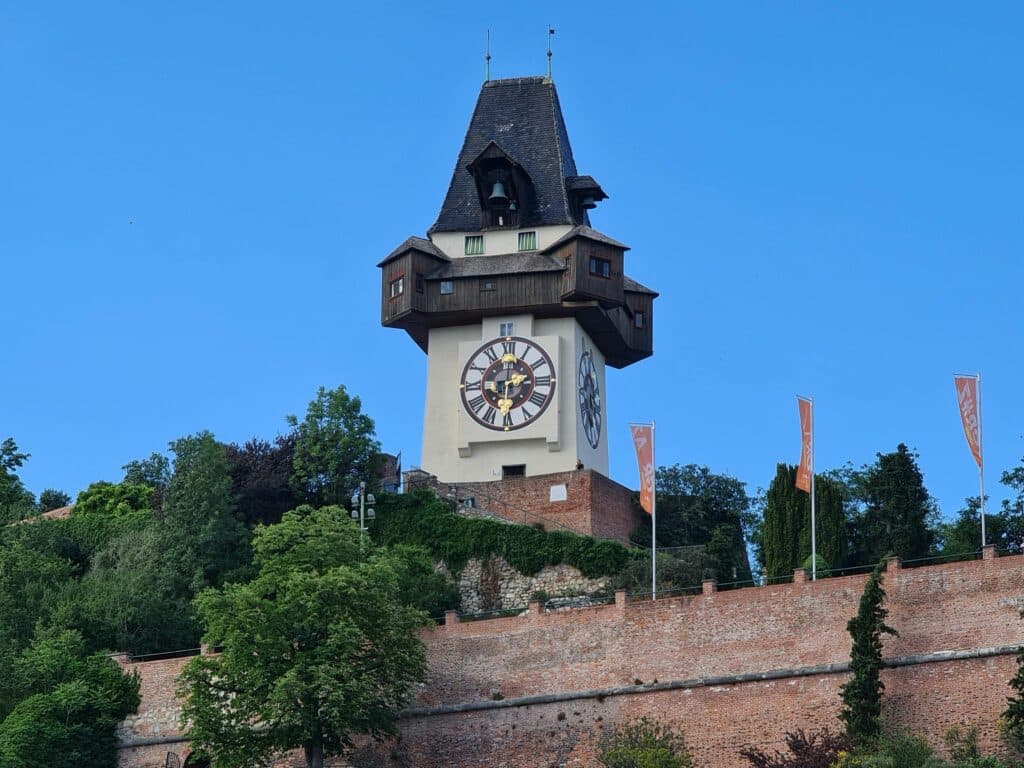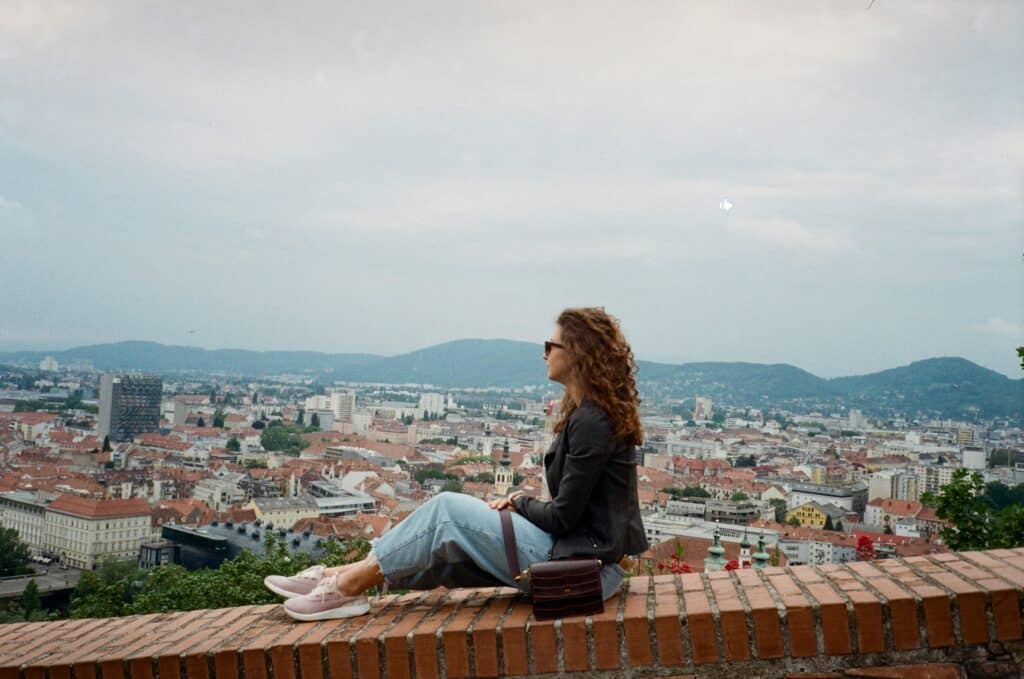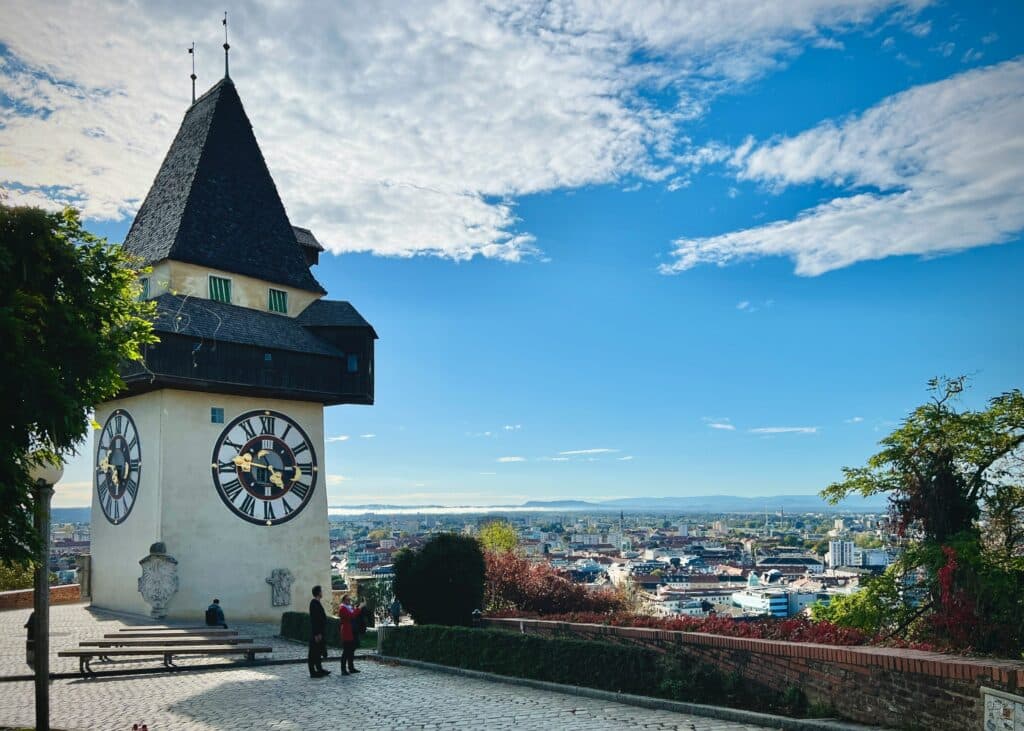
Graz is a young, vibrant university city with a historic medieval center. Known for its beauty, history, and rich culture, Graz is a popular relocation spot. And having spent quite a bit of time there myself, I can see why.
At Remitly, we understand that moving to a new city can be daunting. That’s why we’ve created this easy guide to help you move and settle in smoothly in Graz.
| Quick Facts about Graz | |
| Population | 364,512 |
| Popular neighborhoods | Innere Stadt, Lend, Gries, St. Leonhard, Geidorf, Andritz, Eggenberg |
| Average rent for a 1-bedroom apartment | 600 – 1200 EUR/month |
| Top industries | Manufacturing, Automobiles and auto parts, Telecommunication, Medical technology, Renewable energy, Food and Drink production, Tourism |
| No. of expats | 74,789 |
Table of Contents
Understanding Graz
Graz is the capital of Styria, a federal state in Austria. It’s perched southeast of the main ridge of the Alps. Despite this, snow is relatively rare here. You’ll enjoy mild winters and warm summers, as well as a decent amount of rain.
Although Graz is Austria’s second-largest city after Vienna, its medium-sized urban center still provides a high quality of living. It’s also a cultural melting pot, with a little over a quarter of its inhabitants being immigrants. Many come from neighboring European countries, like Germany, Hungary, Italy, Slovenia, and Switzerland. You’ll find significant American, Türkish, Syrian, and Afghan communities, too.
People in Graz—and Austria in general—speak German. However, Austrian German differs slightly from Standard German, with minor variations in some words and phrases. Some residents also speak English, so you’ll find communication easy to navigate.
Where to live in Graz
Graz is a safe city, and there are no neighborhoods you should necessarily avoid. But depending on your lifestyle and priorities, some areas will suit you better than others.
Popular neighborhoods
Graz is home to one of Europe’s best-preserved city centers. Its neighborhoods reflect this rich history in ancient arched courtyards and distinct Renaissance, Baroque, and Gothic architecture. Here are some popular options:
Downtown Innere Stadt
If you want to be at the heart of the action, consider living in Graz’s Innere Stadt (City Center). This is where you’ll find the Altstadt von Graz (Old Town) and Hauptplatz, the bustling main square. Many of the city’s major landmarks, like Schlossberg and the Graz Opera, are also located here.
Living in the city center is convenient because of its proximity to restaurants, shops, and public transportation. But since this is the busier, more touristy part of the city, rent prices will be higher than in other areas.
Up-and-coming Lend and Gries
Lend is a trendy, artistic neighborhood. It’s famously the home of Kunsthaus Graz or the “Friendly Alien,” the city’s emblematic contemporary art museum. Lend also has a creative cultural scene, with hip bars and unique shops. One of its biggest draws is the Lendplatz, with its daily farmers’ market and weekly events.
Located just south of Lend is Gries, one of the more affordable areas to live near Graz’s city center. It’s also close to the city’s main train station, making this a convenient choice if you’re planning to commute or travel outside Graz often.
Student-centric St. Leonhard and Geidorf
Whether you’re coming to study or simply want to enjoy the lively atmosphere of a student neighborhood, St. Leonhard is a great option. It is just east of the city center and the location of the Technical University in Graz (TU Graz).
Head north and you’ll reach Geidorf, where you’ll find the University of Graz. This leafy neighborhood houses a mix of students and an older population.
Family-friendly Andritz and Eggenberg
Andritz is ideal for young families or those who prefer to live further outside the city. While it’s only a short bike, tram, or car ride from the city center, you’ll be much closer to nature and green spaces in Andritz.
West of the center, you’ll find Eggenberg neighborhood and the iconic 17th-century Schloss Eggenberg (Eggenberg Palace). You can get into the heart of Graz in less than 15 minutes via tram or bike, but still benefit from a quieter, greener area with smaller buildings and single-family homes.
Finding accommodation
Willhaben.at is a good place to start when renting an apartment in Graz. If you’re searching for a room in a shared flat, check out WG-Gesucht.de. To avoid agency commissions, there are also a number of Facebook groups dedicated to finding housing in the city, like Wohnungen in Graz – ohne Makler, GRAZ: Wohnungen ohne Provision, and Wohnungen in Gras Provisionsfrei.
If you’re looking to buy, ImmobilienScout24 and local real estate agencies are your best bet. Just note that when you move to a new apartment in Austria, you have to register your place of residence with the government (Meldeamt) within three days.

Getting around Graz
Graz is a relatively small city, so you can get around without a car or relying on public transportation. In my experience, it’s easy to walk just about anywhere within the city center.
Public transportation in Graz
The two main public transportation options in Graz are the bus and tram. Both are relatively reliable, though their services are limited at night.
When you buy a public transportation ticket, you can use it on both the tram and bus systems. You have the option to buy an hourly (3.10 EUR) or 24-hour ticket (6.80 EUR), as well as weekly, monthly, and annual passes.
Biking in Graz
Biking is the best way to get around Graz. Thanks to the city’s small size, you can get just about anywhere by bike in 30 minutes or less. Graz is also relatively flat, and it’s equipped with extensive bike lane infrastructure.
Because of its big biking culture, the city and its residents are used to—and respectful of—this type of transportation. A quality bike lock will keep your bike secure whenever it’s out of view.
Driving in Graz
Are you planning to live in or near the city center? Then you probably won’t need a car. But if you do get one, you’ll first have to convert your driving license within the first six months of moving to Austria. However, if you come from another EU or EEA country, converting your license is optional.
Depending on where you got your driver’s license, this process may include taking a practical driving test.
Essential services and amenities
Living in Graz can be an exciting adventure, especially when you know how to acquire the basics. Here’s where to find everything you need here:
- Groceries
The main grocery stores in Graz are Spar and Billa. However, there are also several farmers’ markets throughout the city, like Josef Markt and Lendplatz, where you can buy fresh produce.
- Healthcare
Healthcare in Austria is primarily public, but you can opt to purchase private health insurance too. Monthly premiums range between 100-200 EUR for a young adult with no preexisting conditions. There are a number of both public and private hospitals in Graz.
- Banking
Raiffeisen Bank Austria, Steiermärkische Sparkasse, and UniCredit Bank are the main banks operating in Graz. You may have to provide proof of residence and proof of employment to open a bank account.
- Utilities
Setting up utilities in Graz is a relatively straightforward process. When you rent an apartment, your water and waste expenses are typically covered by your landlord. You’ll be in charge of covering electricity and gas, which you can usually get from the same provider and set up via phone or online.
- Administrative services
You’ll have to visit the government office (Amt der Steiermärkischen Landesregierung) and deal with Austrian bureaucracy at some point. Usually, officials don’t speak much English, so if you don’t feel comfortable with your German, bring a translator to any appointments.
Embracing the lifestyle
The historic city of Graz is a UNESCO World Heritage Site with an eclectic cultural scene. You’ll find plenty of things to do there—whether you like nature and spending time outside, are more interested in art and design, or spend your time watching sports and motor racing.
Making friends in Graz
Graz is a friendly city and Austrians are great people, but it can sometimes be hard to crack their shell. I recommend taking the initiative to find activities and hobbies where you can connect with others, whether that’s going to a language school, joining one of the local climbing gyms, or taking tango lessons.
Additionally, while many in Graz speak English, learning German can be very helpful if you’re hoping to meet and form friendships with locals.
Things to do in Graz
Despite its small size, I’m always pleasantly surprised by how many things there are to do in Graz. My first recommendation? Hike up to the famous Schlossberg hilltop castle to see the medieval Uhrturm clocktower, then take the Schlossbergrutsche slide back down to the center.
The town’s historical main square, Hauptplatz, is surrounded by coffee houses, restaurants, and shops. There are also several green spaces within the city, like Augarten, Stadtpark, and Volksgarten. You’ll find biking and walking paths along the Mur River.
The Murinsel floating island, designed by architect Vito Acconci, is centrally located on the river. It regularly hosts events like free movie screenings, literature readings, and theater productions. I think this structure is such a beautiful part of the city, and it’s one example of Graz’s importance in the design world as an officially recognized UNESCO City of Design.
If you’re a sports fan, try to catch an SK Sturm Graz game at Merkur Arena. The team is one of the best in the Austrian league, the Bundesliga.
Here’s some further information on how to fill your free time in Graz.
- Dining and nightlife: You can find all types of food in Graz, from typical Austrian cuisine to Mediterranean, Indian, and Japanese fare. In terms of nightlife, options range from dance clubs to wine bars, and there’s no shortage of locales to spend your weekends and evenings.
- Culture: Graz has 34 museums in addition to the city’s permanent exhibitions, modern art galleries and the Universalmuseum Joanneum, Austria’s oldest museum.
There are tons of events throughout the year, including culinary, music, and film festivals, as well as Christmas markets around the holidays. There are also plenty of music offerings, from the Graz Opera to outdoor concerts at the Schlossberg.
- Beyond the city: Be sure to check out the Buschenschänke in nearby towns. These local taverns sell wines of their own production and local, homemade food. If cars and motorcycles are more your thing, the Red Bull Ring racing track is only about an hour drive from the city.
Graz is well-connected to Vienna and relatively close to the Alps and the beautiful lakes in Carinthia, plus just a few hours drive from Slovenia and Croatia and their coasts.
Working and studying in Graz
Most people come to Graz to work or study. Two of the largest companies here hire expats, and most professionals are in the IT, automotive, and engineering fields. Average salaries depend on your industry, but a decent monthly paycheck is anywhere between 1,500 EUR and 2,500 EUR.
Graz also has two large universities: Universität Graz and Technische Universität Graz. The city has a bustling student population, so the Styrian capital is a great place to move for your studies.
Work and study permits are necessary for non-EU citizens, so check with your employer or university for visa support. EU residents don’t need a visa but must apply for an Aufenthaltstitel (residence permit).

More information
Moving to a city popular with tourists and foreigners—like Graz, Vienna, Innsbruck, or Salzburg—brings unique challenges. One of the biggest is finding a balance between the comfort of the expat community and the reward that comes with integrating with locals.
So when you’re in Graz, make those connections, even if it’s hard at first. Take the time to study German, get to know your neighbors, and join clubs that spark your interest. With a little effort, you’ll overcome those first hurdles and discover how rich Austrian culture and heritage is.
For more tips on planning your move, check out our international moving checklist and guide to making friends in a new city.
FAQ
Graz is one of the best to live out of all Austrian cities. It’s relatively small, meaning it’s easy to get around. From Hungarians to Americans and more, it’s home to a diverse expat population. And the cost of living is cheaper than in Vienna, despite Graz being the country’s second-largest city.
The average cost of living in Graz is roughly 1,500 EUR for a single person, though that depends on your lifestyle and needs. That said, you can live comfortably in Graz with a salary of around 1,500 EUR after taxes.
In Graz and Austria in general, punctuality is very important. Being late is a social taboo, especially in professional settings. Additionally, Austrians tend to use formal titles and greetings, like Grüß Gott, though the younger generation is becoming a bit more relaxed.
